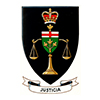Judicial Independence
An independent judiciary protects the public, not just the judiciary. It is the cornerstone of our constitutional democracy. It is fundamental to a society governed by the Rule of Law. In Canada, this means, as is set out in section 52 of the Constitution Act, 1982, that the Constitution is the supreme law of the country. Our constitutional democracy is comprised of three branches of government — the executive, the legislative and the judicial — and all three branches of government must exercise their power and authority in accordance with the Constitution. While it is the legislature that enacts legislation, it is the role of the judiciary to interpret and apply the law. To fulfill this role, the judiciary must be independent.
The principle of judicial independence is particularly important given that the provincial Attorney General is responsible for the Court’s administration. This includes providing the Court with courthouses, staff, and technology. Ontario’s Courts of Justice Act recognizes that the Attorney General’s responsibility to support the Court must be fulfilled in a way that maintains judicial independence. Among other things, this requires that all aspects of administration relating to the judicial function, including the direction and supervision of the Court’s sittings and the assignment of judicial duties, remain solely under the judiciary’s control. This relationship is the subject of a Memorandum of Understanding (“MOU”) executed in 2008 between the Chief Justice and the Attorney General. This MOU provides the framework within which the Chief Justice and Attorney General work collaboratively to address areas of mutual concern while, at the same time, preserving judicial independence.
The principle of judicial independence is generally recognized as having two dimensions. The first applies to individual judges and embodies the fundamental principle that a judge must be, and must be seen to be, free to decide each case on its own merits, without interference or influence of any kind from any source, including politicians. The second applies to the Court as an institution. It requires the Court, as a whole to be, and appear to be independent of the legislative and executive branches of government. Together, both dimensions safeguard the judicial decision-making process and, in turn, the public that the Court serves. Every Canadian has the constitutional right to have their legal issues decided by fair and impartial judges. Our justice system is founded on public confidence that decisions, whether popular or not, are fully heard and fairly made. It is crucial that judges are both actually independent and appear to be independent so the public can be confident that judicial decisions are made without bias. To guarantee the right to an independent and impartial judiciary, the law in Canada has three constitutional protections or “essential conditions” that ensure judicial independence:
- Security of tenure, preventing the arbitrary removal of judges;
- Financial security, providing an arm’s length mechanism, through an independent remuneration commission, for determining the salaries and benefits of judges; and
- Administrative independence, enabling a court to manage itself, rather than be managed by others.
While these protections apply to judiciary, they are for the public’s benefit. They allow courts to apply the Rule of Law that Canadians, through the electoral and legislative processes, have decided should govern them.
More Resources
- The Canadian Judicial Council (CJC) ( created in 1971 by the Canadian Parliament) is made up of the Chief Justice of the Supreme Court of Canada and the federally nominated Chief Justices and Associate Chief Justices of Canadian Superior courts. The goal of the Council is to improve the efficiency and consistency in the administration of justice before the courts and the quality of services in Canada's superior courts. See its May 2016 Publication “Why is Judicial Independence Important to You?”
- To watch a video describing judicial independence see the Canadian Bar Association's video Got questions about judicial independence?
